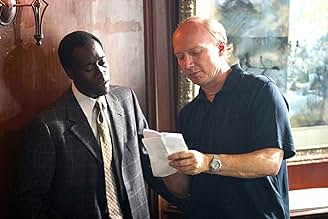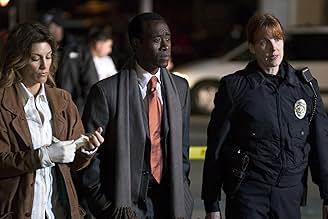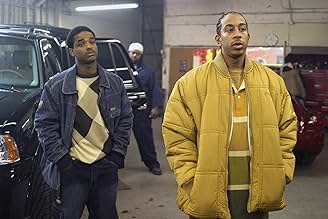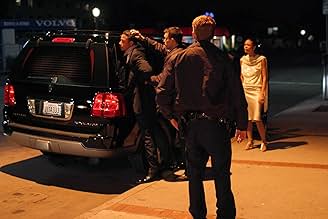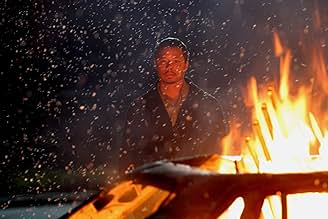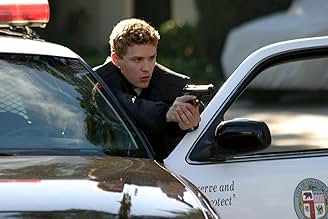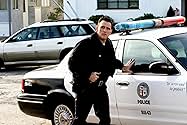O roubo de um carro de luxo culmina em um acidente que acaba por aproximar habitantes de diversas origens étnicas e classes sociais de Los Angeles.O roubo de um carro de luxo culmina em um acidente que acaba por aproximar habitantes de diversas origens étnicas e classes sociais de Los Angeles.O roubo de um carro de luxo culmina em um acidente que acaba por aproximar habitantes de diversas origens étnicas e classes sociais de Los Angeles.
- Direção
- Roteiristas
- Artistas
- Ganhou 3 Oscars
- 66 vitórias e 112 indicações no total
Thandiwe Newton
- Christine
- (as Thandie Newton)
Eddie J. Fernandez
- Officer Gomez
- (as Eddie Fernandez)
Avaliações em destaque
I can't believe all the reviews I'm reading. And not just on IMDb but in the printed press too. People seem to love this movie, and I don't understand.
I felt it was a solid movie with excellent music and cinematography. Yet, if that was all that mattered, Phantom Menace would be an Oscar winner.
It seemed to me that there were very few original ideas in the script. The racial plot lines were done better in "Grand Canyon", "Do the Right Thing" and "Boyz n the Hood".
If you haven't seen any of the above movies, perhaps "Crash" will open up your eyes to the depths of the racial divide in this country. Otherwise, you're better off with something a little more subtle and original.
I felt it was a solid movie with excellent music and cinematography. Yet, if that was all that mattered, Phantom Menace would be an Oscar winner.
It seemed to me that there were very few original ideas in the script. The racial plot lines were done better in "Grand Canyon", "Do the Right Thing" and "Boyz n the Hood".
If you haven't seen any of the above movies, perhaps "Crash" will open up your eyes to the depths of the racial divide in this country. Otherwise, you're better off with something a little more subtle and original.
"Crash" is a superbly made film. The actors are first rate, the camera style is engaging, and production value is tops. And despite all this, I would never recommend it to anyone. Why? I'll explain in my 4th paragraph but first let's talk about the story.
This film follows the lives of a dozen or so people over the course of 2 days all living in Los Angeles. The opening scene gives us the aftermath of some ambiguous tragedy (the titular "crash"), and the next scene flashes back to "yesterday" and shows us the events in these people's seemingly unrelated lives, leading up to that opening moment. If you've seen "House of Sand and Fog" (the #1 Feel Bad Movie of the 2000s), you'll recognize an identical sort of chronology and foreboding tone--so similar that I wonder if the Crash filmmakers were somehow involved in House as well. Both films are very powerful and effective at what they aim to do, and that is, simply put, to disturb us.
Disturb us it does. Within the first 15 minutes, we see things that are so disturbing to the pit of our souls that I almost shut the movie off twice. Racism, hate, justified racism, justified hate, brutal stereotypes. The film masterfully shows us not only the worst quality of humankind but it scrutinizes the reasons why humans are this way. There's no good guy/bad guy; it's all bad guys. The first 15 mins is designed to make us hate almost every character, if not every race. By showing the atrocity that each race supposedly inflicts on the other, it paints us a Hatfield-McCoy cycle of hatred that has no known origin. It just exists and burns hotter. Non-whites are subverted by white society, so they exact revenge by committing crimes against white people which in turn causes the white police to hate and abuse non-white people who in turn become criminals against white people. The cycle of hate is not only explained but validated in a well-crafted, brutally told, highly disturbing way.
Which leads me to the 4th paragraph where I explain why I would never recommend this film. It's because IT JUST MAKES YOU FEEL BAD. For nearly 2 hours you get the same feeling you get when you watch too much cable news. And just as psychologists warn that watching too much news leads to depression, I would say the same can be said of films like this which, like the news, expose and scrutinize the absolute worst of humanity.
But then one might say that films like this are necessary to inspire change. Normally I would agree, and I'm sure that that's the intent of the filmmakers here. But let me ask you: who needs to change? Answer: racists and bigots. But are racists and bigots really going to be watching "Crash", stroking their beards and saying "Golly, I need to stop being a racist"? Probably not. And that is the film's undoing. By taking a heavy, ponderous, complex look at racism and hate, it alienates the fury-driven haters who most need to grasp this message. And instead "Crash" merely preaches to the choir, making the choir feel gawd awful lousy about the state of the world.
The film attempts to lead us to redemption, and there is at least 1 truly powerful scene of triumph that's worth the price of admission. However, other subplot resolutions seem a bit contrived, if not completely unnecessary, such as one character's climactic tragedy & epiphany which was so random I literally burst out laughing (the moral of the story being: don't wear socks indoors!). Ultimately "Crash" tries to tie things up neatly with a positive message, but it's precisely this neat tie-up, simultaneously with every sub-plot, that feels a bit contrived and ultimately unbelievable. At the risk of cutting out half the award-winning cast, perhaps the film should have focused on just 1 story & resolution, rather than pulling the "Fantasy Island" formula of having half a dozen stories wrap up neatly in the last 10 minutes.
Ultimately, despite its excellent presentation and first class acting, "Crash" couldn't sell me on its optimistic spin and instead left me feeling pretty horrible about the reality of living in a world where racists don't often have magical transformations. If you understand what I'm saying, you might want to skip this flick because, regardless of how it ends, the subject will just make you feel bad.
This film follows the lives of a dozen or so people over the course of 2 days all living in Los Angeles. The opening scene gives us the aftermath of some ambiguous tragedy (the titular "crash"), and the next scene flashes back to "yesterday" and shows us the events in these people's seemingly unrelated lives, leading up to that opening moment. If you've seen "House of Sand and Fog" (the #1 Feel Bad Movie of the 2000s), you'll recognize an identical sort of chronology and foreboding tone--so similar that I wonder if the Crash filmmakers were somehow involved in House as well. Both films are very powerful and effective at what they aim to do, and that is, simply put, to disturb us.
Disturb us it does. Within the first 15 minutes, we see things that are so disturbing to the pit of our souls that I almost shut the movie off twice. Racism, hate, justified racism, justified hate, brutal stereotypes. The film masterfully shows us not only the worst quality of humankind but it scrutinizes the reasons why humans are this way. There's no good guy/bad guy; it's all bad guys. The first 15 mins is designed to make us hate almost every character, if not every race. By showing the atrocity that each race supposedly inflicts on the other, it paints us a Hatfield-McCoy cycle of hatred that has no known origin. It just exists and burns hotter. Non-whites are subverted by white society, so they exact revenge by committing crimes against white people which in turn causes the white police to hate and abuse non-white people who in turn become criminals against white people. The cycle of hate is not only explained but validated in a well-crafted, brutally told, highly disturbing way.
Which leads me to the 4th paragraph where I explain why I would never recommend this film. It's because IT JUST MAKES YOU FEEL BAD. For nearly 2 hours you get the same feeling you get when you watch too much cable news. And just as psychologists warn that watching too much news leads to depression, I would say the same can be said of films like this which, like the news, expose and scrutinize the absolute worst of humanity.
But then one might say that films like this are necessary to inspire change. Normally I would agree, and I'm sure that that's the intent of the filmmakers here. But let me ask you: who needs to change? Answer: racists and bigots. But are racists and bigots really going to be watching "Crash", stroking their beards and saying "Golly, I need to stop being a racist"? Probably not. And that is the film's undoing. By taking a heavy, ponderous, complex look at racism and hate, it alienates the fury-driven haters who most need to grasp this message. And instead "Crash" merely preaches to the choir, making the choir feel gawd awful lousy about the state of the world.
The film attempts to lead us to redemption, and there is at least 1 truly powerful scene of triumph that's worth the price of admission. However, other subplot resolutions seem a bit contrived, if not completely unnecessary, such as one character's climactic tragedy & epiphany which was so random I literally burst out laughing (the moral of the story being: don't wear socks indoors!). Ultimately "Crash" tries to tie things up neatly with a positive message, but it's precisely this neat tie-up, simultaneously with every sub-plot, that feels a bit contrived and ultimately unbelievable. At the risk of cutting out half the award-winning cast, perhaps the film should have focused on just 1 story & resolution, rather than pulling the "Fantasy Island" formula of having half a dozen stories wrap up neatly in the last 10 minutes.
Ultimately, despite its excellent presentation and first class acting, "Crash" couldn't sell me on its optimistic spin and instead left me feeling pretty horrible about the reality of living in a world where racists don't often have magical transformations. If you understand what I'm saying, you might want to skip this flick because, regardless of how it ends, the subject will just make you feel bad.
After seeing this movie, I was able to really understand what "Six Degrees of Separation" means. There is a thread that weaves its way through the landscape of life connecting, influencing, and defining all. This movie is certainly thought-provoking, one cannot watch it without feeling either privileged to have become part of the fabric, or like a fly on the wall - seeing, yet unable to influence or guide. There is almost a sense of frustration at ones inability to be no more than an observer in this movie since it compels you to want to shout in warning, gasp in shock, cry in sorrow, and hold in comfort. "Crash" is definitely not a movie to use as a venue to escape life for a couple of hours, but it is a movie that certainly makes you take a second and third look at who you are within yourself. The actors are surprising not only for their depth of performance, but also because they do not play characters you think you know. I would highly recommend this movie to anyone who likes drama, action, comedic relief, or just an appreciation for a well-thought out movie.
Take the pop-cultured infused socio-political discourse of a Spike Lee movie, the glossy grit of a Michael Mann LA crime story, and the compelling mosaic story-telling technique of a Paul Thomas Anderson film, and you'll get the "feel" for Paul Haggis' stunning directorial debut. To boil a film like "Crash" down to such terms, however, would do it severe injustice. Powerful and thought provoking, this is the most accomplished and compelling film since "21 Grams" premiered back at the end of 2003.
"Crash" brilliantly shows through intertwining vignettes, that are often blazingly funny in their brutal honesty and fascinatingly gut-wrenching in their melodrama, how subtle racism (often guised in nervous humor) and overt prejudice (often exasperated by sudden irrational violence and an overabundance of readily available firearms) completely permeate our culture and everyday interactions within society. A hyper intelligent script showcases not characters, but brilliant representations of real people, people we know and pass in the street every day, people not unlike us. People who at first seem to be lost causes in the war against racism (witnessed in Matt Dillon's harried beat cop and Sandra Bulluck's spoiled District Attorney's wife) can often become the most unlikely solutions to the problem, while people who ride in on their high horse (witnessed in Ryan Phillipe's noble young police officer) can turn against the tide in the blink of an eye. No one is immune to it no matter how hard they try to rise above it (witnessed in Don Cheadle's quietly tragic detective).
In the end, everyone is flawed, the racism is inescapable, and the audience feels a twinge of sympathy for just about everyone. Perhaps that is what Haggis is hinting at to be our answer. Showing empathy and being able to relate even on the most remote level to every human being out there is the first step to that true brotherhood of man. Because the film offers no real solution, the discussion and discourse it creates in the minds of the viewers is the first step in solving society's ills. We can't tackle everything at once, but we can open a dialogue, and hopefully, one person conversing with another will be the first step to our salvation. It takes a bold film to raise such questions, and an even greater one to compel an audience to talk about the potential answers, and that is exactly what "Crash" accomplishes.
"Crash" brilliantly shows through intertwining vignettes, that are often blazingly funny in their brutal honesty and fascinatingly gut-wrenching in their melodrama, how subtle racism (often guised in nervous humor) and overt prejudice (often exasperated by sudden irrational violence and an overabundance of readily available firearms) completely permeate our culture and everyday interactions within society. A hyper intelligent script showcases not characters, but brilliant representations of real people, people we know and pass in the street every day, people not unlike us. People who at first seem to be lost causes in the war against racism (witnessed in Matt Dillon's harried beat cop and Sandra Bulluck's spoiled District Attorney's wife) can often become the most unlikely solutions to the problem, while people who ride in on their high horse (witnessed in Ryan Phillipe's noble young police officer) can turn against the tide in the blink of an eye. No one is immune to it no matter how hard they try to rise above it (witnessed in Don Cheadle's quietly tragic detective).
In the end, everyone is flawed, the racism is inescapable, and the audience feels a twinge of sympathy for just about everyone. Perhaps that is what Haggis is hinting at to be our answer. Showing empathy and being able to relate even on the most remote level to every human being out there is the first step to that true brotherhood of man. Because the film offers no real solution, the discussion and discourse it creates in the minds of the viewers is the first step in solving society's ills. We can't tackle everything at once, but we can open a dialogue, and hopefully, one person conversing with another will be the first step to our salvation. It takes a bold film to raise such questions, and an even greater one to compel an audience to talk about the potential answers, and that is exactly what "Crash" accomplishes.
Lives, ordinary lives, vital part of a city where, I'm sure, the devil has him home. Contradictory, awful, enlightened, confused. There are so many good moments in "Crash" that I felt the need to see it again less than 24 hours later. Matt Dillon lead us through his own contradiction with the humanity of someone who knows he carries something rotten inside. The explosive dissatisfaction that permeates Sandra Bullock's life is ferociously real and the frustration of Thandie Newton's character is a first on the screen. We've never seen it quite like that and her performance will stay with me. Larenz Tate personifies both sides of the equation, the one who understands but goes against his instincts, and still there are chilling flashes of innocence in his eyes -- his performance reminded me of the wonderful "Seeds Of Tragedy" were his innocence was intact. The problem with "Crash" and it is problem is that remains a rather shallow affair. Cleverly put together but epidermic at best.
Oscars Best Picture Winners, Ranked
Oscars Best Picture Winners, Ranked
See the complete list of Oscars Best Picture winners, ranked by IMDb ratings.
Você sabia?
- CuriosidadesPaul Haggis holds the distinction of being the only person ever to write the screenplay for two consecutive Best Picture winners. He also wrote the previous year's Best Picture winner, Menina de Ouro (2004).
- Erros de gravaçãoPartway through Officer Ryan's rescue of Christine from her overturned SUV, the camera ran out of film, as evidenced by film sprocket holes appearing in the frame. This is an acknowledged goof from director Paul Haggis.
- Citações
[first lines]
Graham: It's the sense of touch. In any real city, you walk, you know? You brush past people, people bump into you. In L.A., nobody touches you. We're always behind this metal and glass. I think we miss that touch so much, that we crash into each other, just so we can feel something.
- Cenas durante ou pós-créditosProducers gratefully acknowledge the valuable assistance of The Culbert Family; Members of the Actors Gym, Hollywood, California.
- Versões alternativasThe two-disc director's cut DVD features an additional two minutes of dialogue and footage
- ConexõesFeatured in 'Crash' Featurette (2005)
- Trilhas sonorasCity of Angel
Written by Sungsoo Kim
Published by Nirvana Music
Performed by Sungsoo Kim
Courtesy of Cats Records
Principais escolhas
Faça login para avaliar e ver a lista de recomendações personalizadas
Detalhes
- Data de lançamento
- Países de origem
- Central de atendimento oficial
- Idiomas
- Também conhecido como
- Alto impacto
- Locações de filme
- 3500 S. Gaffey Street, San Pedro, Los Angeles, Califórnia, EUA(overturned car accident)
- Empresas de produção
- Consulte mais créditos da empresa na IMDbPro
Bilheteria
- Orçamento
- US$ 6.500.000 (estimativa)
- Faturamento bruto nos EUA e Canadá
- US$ 54.580.300
- Fim de semana de estreia nos EUA e Canadá
- US$ 9.107.071
- 8 de mai. de 2005
- Faturamento bruto mundial
- US$ 98.410.061
- Tempo de duração1 hora 52 minutos
- Cor
- Mixagem de som
- Proporção
- 2.35 : 1
Contribua para esta página
Sugerir uma alteração ou adicionar conteúdo ausente


